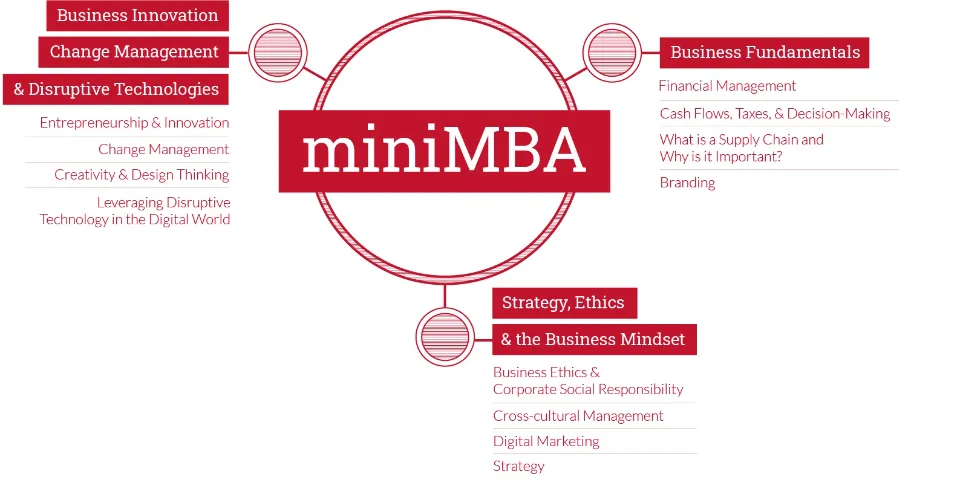We go over what a mini MBA is in this article, the advantages of enrolling in the program, and the differences and similarities between a mini MBA and a full MBA program.
Many aspiring and seasoned business professionals are choosing to complete a mini MBA. A mini MBA is what, then? If business students and professionals are unsure whether they want to enroll in an MBA program, a mini MBA (Master of Business Administration) is a quick, frequently affordable certificate option.
The many advantages of a mini MBA are covered in the guide that follows.
What is a Mini MBA?
As the name implies, the Mini MBA is a fast-track version of the MBA that condenses the course material from one or two years’ worth of coursework into about 40 hours. Considering the accelerated format, many may wonder, “What is the value of a mini MBA?”
A balcony view of the business world, the Mini MBA shows how everything fits together. Their curriculum offers students an introduction to business, laying the groundwork for further study or a fundamental understanding.
The two main versions of the Mini MBA are the week-long accelerated program and the week-long extended program. The week-long format offers focused, educational training, typically on a particular subject.
For instance, Rutgers Business School in New Brunswick offers a Mini MBA in digital marketing, which is a five-day program that covers all aspects of the field.
In the extended format, lessons are typically spread out over 12–14 weeks and are taught in three–4 hour weekly classes. For instance, each week’s theme in Opus’ Mini MBA program might be leadership, business ethics, or finance.

What Are the Benefits of a Mini MBA Program?
Mini MBAs can save a lot of money and time while still providing a flexible curriculum when compared to a full-time, traditional MBA. While completion times vary, mini MBA programs can usually be finished in under a semester. The mini MBA program can also be tailored by students to fit their professional aspirations.
Faster Path to Graduation
Shortcuts to graduation are provided by a mini MBA. This kind of program is ideal for students who may be hesitant to enroll in a full-time program but are nonetheless interested in the advantages of an MBA. Typically, mini MBA programs last between a few weeks and three months.
Lower Cost
Mini MBAs provide much-needed financial relief to budget-conscious students since traditional MBA costs frequently exceed $100,000. Mini MBAs typically cost a few thousand dollars in tuition, though costs vary by school and program.
Some online programs provide additional savings by charging the same tuition fees to all distance learners, regardless of where they live.
Increased Flexibility
Compared to a traditional MBA, mini MBAs might be more popular among students. Students who want more flexibility in their education—both in terms of the curriculum and enrollment options—are catered to by accelerated programs.
Numerous mini MBA programs provide a range of intensive concentrations and weekend, night, and/or online classes. The majority also accept applicants with and without experience.
Who Should Consider a Mini MBA?

Three primary candidate types are targeted by the Mini MBA. The aspiring full-time MBA candidate is the most typical. Candidates can get a taste of what a business degree is like with the Mini MBA before deciding to enroll.
Most graduates of Farmer’s Mini MBA continue on to pursue a full-time MBA. Compared to a prospectus or an open house, it provides candidates with a much more thorough understanding of what an MBA entails.
At Miami, earning a full-time MBA is further encouraged by the fact that tuition for the full-time MBA can be reduced by the $3,000 cost of the Mini MBA program.
The candidate who wants to improve their knowledge in a particular field is the second typical type. The Mini MBA might be the best option for those looking for a more specialized focus, whereas a full-time MBA gives you a comprehensive view of all business areas.
For instance, the Marketing Week Mini MBA divides marketing into 12 distinct modules and concludes with an exam. It is best suited for people whose interests include marketing.
The third type of applicant is a student who wants to improve their knowledge and skills in business while continuing to work in a particular field—for example, as a lawyer or an architect. Learning business terminology and grasping systems thinking in the context of business are key.
A Mini MBA Vs a Full-Time MBA Program
There are some similarities between full-time and mini MBA programs, but there are also many differences. They differ greatly in terms of price, program structure, breadth of topics covered, and employer perception.
Because of its lower tuition and accelerated format, the mini MBA is popular among students. Additionally, students with an MBA who want to pursue a second specialization may find mini MBAs appealing.

Additionally, a mini MBA enables students interested in business to try it out before committing to a two-year program. Many graduates of a mini MBA program ultimately choose to enroll in a full-time program.
Furthermore, students should be aware that many employers favor hiring applicants with a full MBA. The mini MBA is frequently seen as an addition to a full-time MBA, not as a substitute for it.
How Much Does a Mini MBA Program Cost?
In an effort to save money, many students enroll in mini MBA programs. While tuition for mini MBAs varies, full-time MBAs, which can run well over $200,000 at prestigious institutions like MIT, Stanford, and Penn, allow students to learn about the fundamentals of business for a much smaller sum.
Mini MBAs are available for a significantly reduced cost through schools and professional organizations. For instance, the University of Buffalo’s online mini MBA certificate costs less than $1,000, while Pepperdine University’s mini MBA certificate costs about $2,500.
What Can I Expect from a Mini MBA Program?
A mini MBA program differs from a full-time MBA in terms of pace, length, and format, so students should be prepared for this. Mini MBAs typically take less than 15 weeks to complete, though programs vary by school.
Self-paced learning is frequently available in these programs, and most accept participants at various start times throughout the year.
Many online programs offer accelerated timelines, and students can choose between full-time and part-time study options. Asynchronous and/or synchronous coursework are both possible for online mini MBA programs.

What Will I Learn in a Mini MBA Program?
Students can pursue a mini MBA in general business or a concentration in something more specific, like marketing or financial management. Business fundamentals like strategy, finance, and communication are all covered in general programs.
Additionally, they frequently discuss the important connections between each of these components and their importance in the context of the global business landscape.
Targeted mini MBAs are frequently shorter and more narrowly focused. Students who want to hone their skills in a specific business field or complete a degree in a related field, like engineering or a general MBA, may find this option appealing.
Is a Mini MBA Worth It?
Mini MBAs typically draw professionals seeking to advance their skills in a particular field as well as students looking to sample the MBA curriculum.
A mini MBA program frequently enables students to complete work at their own pace while maintaining a full-time job, in contrast to conventional MBAs that may require years of full-time study, which can make it challenging to continue working while earning a degree.
Due to its accessibility and affordability, students frequently choose a mini MBA program; however, the outcomes and career options are frequently different from those of a full-time MBA.
Instead of replacing a full degree, employers typically view the mini MBA as an additional credential. Mini MBA graduates typically require additional training in order to be eligible for positions that are frequently held by MBA grads.
Conclusion: Mini MBA
In a limited amount of time, a mini MBA program offers an overview of everything you might learn in an MBA program.
The mini MBA is appropriate for a range of learners, from college freshmen considering a business degree to seasoned professionals seeking to develop specialized business expertise. Students can use a mini MBA to advance their career opportunities because it offers a lot of the same coursework as a traditional MBA.
FAQs
Is Mini MBA the Same as MBA?
Students can expect a difference in the pace, length, and format of a mini MBA program compared to a full-time MBA. Mini MBAs typically last for less than 15 weeks, though programs vary by school. Numerous start dates throughout the year are available for enrollment in these programs, and many allow for self-paced learning.
Is Harvard Mini MBA Worth It?
Although it does not completely replace a full-time MBA, the Mini MBA does demonstrate how student needs are evolving. A Mini MBA is definitely worth it if you want to expand your business knowledge in a very flexible way and/or get a taste of what a traditional MBA degree might be like.
What is the Cost of the Mini-MBA Certificate?
The program fee for the Leaders Excellence Mini-MBA℠ is $1,395 and includes all costs (not subject to sales tax).







